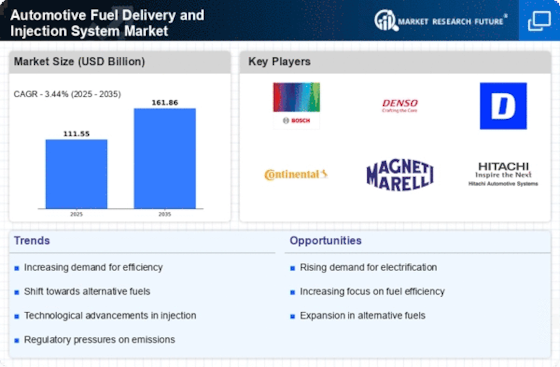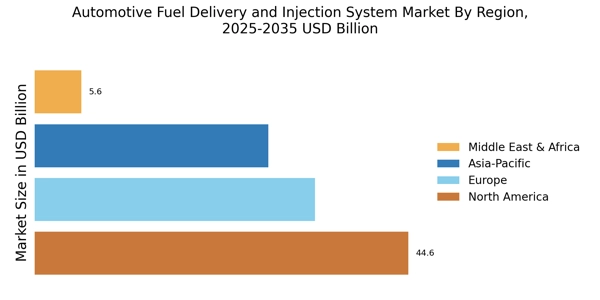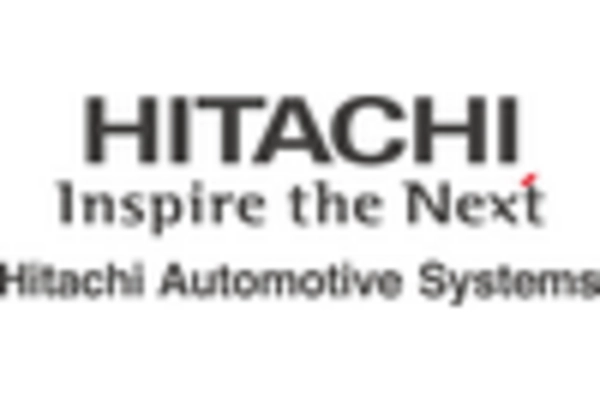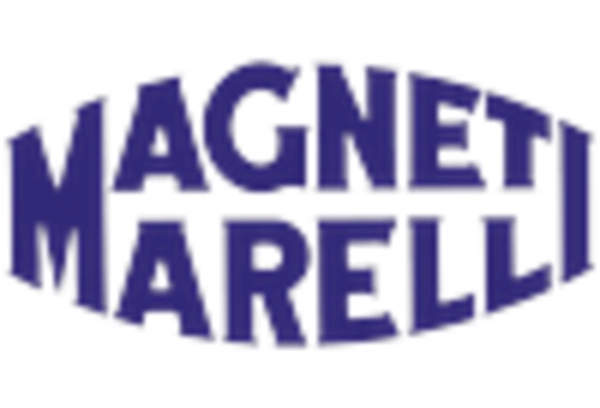Rising Demand for Fuel Efficiency
The Automotive Fuel Delivery and Injection System Market is significantly influenced by the rising demand for fuel efficiency among consumers. As fuel prices fluctuate and environmental concerns grow, consumers are increasingly seeking vehicles that offer better mileage and lower emissions. This trend has prompted manufacturers to invest in advanced fuel delivery systems that optimize fuel consumption. Recent statistics indicate that vehicles equipped with advanced fuel injection systems can achieve up to 30% better fuel efficiency compared to traditional systems. This demand for fuel-efficient vehicles is likely to drive innovation within the market, as companies strive to develop cutting-edge technologies that meet consumer expectations while adhering to regulatory standards.
Integration of Electronic Control Systems
The integration of electronic control systems within the Automotive Fuel Delivery and Injection System Market is transforming how vehicles manage fuel efficiency and emissions. Electronic control units (ECUs) play a crucial role in optimizing fuel delivery based on real-time data from various sensors. This integration allows for precise control over fuel injection timing and quantity, which enhances engine performance and reduces fuel consumption. Market data indicates that the demand for electronic fuel injection systems is expected to rise significantly, with a projected market share increase of 15% by 2026. This trend reflects the automotive sector's shift towards more intelligent and automated systems, which not only improve vehicle performance but also contribute to overall energy efficiency.
Regulatory Compliance and Emission Standards
The Automotive Fuel Delivery and Injection System Market is heavily influenced by regulatory compliance and stringent emission standards imposed by governments worldwide. These regulations are designed to mitigate environmental impact and promote cleaner technologies. As a result, automotive manufacturers are compelled to adopt advanced fuel delivery systems that comply with these standards. Data shows that the market for fuel injection systems is projected to grow by 12% over the next few years, largely due to the need for compliance with increasingly strict emissions regulations. This regulatory pressure not only drives innovation but also encourages manufacturers to invest in research and development to create more efficient and environmentally friendly fuel delivery solutions.
Shift Towards Hybrid and Alternative Fuel Systems
The Automotive Fuel Delivery and Injection System Market is witnessing a notable shift towards hybrid and alternative fuel systems. As consumers become more environmentally conscious, the demand for vehicles that utilize alternative fuels, such as electricity and hydrogen, is on the rise. This transition is supported by government incentives and regulations aimed at reducing carbon emissions. Data suggests that the market for hybrid vehicles is expected to grow by 20% annually, driven by advancements in fuel delivery technologies that accommodate these alternative systems. Consequently, manufacturers are increasingly focusing on developing fuel injection systems that are compatible with a variety of fuel types, thereby expanding their market reach and meeting evolving consumer preferences.
Technological Advancements in Fuel Delivery Systems
The Automotive Fuel Delivery and Injection System Market is experiencing a surge in technological advancements that enhance fuel efficiency and performance. Innovations such as direct fuel injection and variable valve timing are becoming increasingly prevalent. These technologies not only improve combustion efficiency but also reduce emissions, aligning with stringent environmental regulations. According to recent data, the adoption of advanced fuel injection systems is projected to grow at a compound annual growth rate of 6.5% over the next five years. This growth is driven by the automotive industry's focus on sustainability and the need for compliance with global emissions standards. As manufacturers invest in research and development, the market is likely to witness the introduction of more sophisticated fuel delivery systems that cater to consumer demands for better performance and lower environmental impact.

















